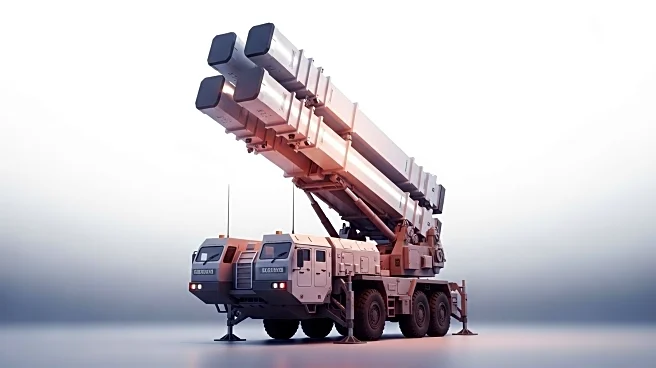What's Happening?
India has finalized a deal to purchase multi-role missiles from Thales, a UK-based manufacturer, in a transaction valued at £350 million ($468 million). The agreement was signed during UK Prime Minister Keir Starmer's visit to Mumbai, marking a significant step in the defense partnership between the two nations. The deal involves the delivery of the Lightweight Multirole Missile (LMM) to the Indian Army, which is expected to enhance India's defense capabilities. The UK government has expressed its intention to expand its share in the Indian defense market, which is currently dominated by other Western suppliers such as France, the United States, and Israel. This deal follows a previous contract between Thales and Bharat Dynamics for a laser-guided air-defense system, indicating a growing collaboration between UK and Indian defense industries.
Why It's Important?
The acquisition of Thales missiles by India signifies a strategic shift in its defense procurement, moving away from traditional suppliers like Russia towards Western nations. This transition is crucial for India as it seeks to modernize its military capabilities amidst regional security challenges. The deal not only strengthens bilateral defense ties but also supports job creation in Northern Ireland, where the missiles are manufactured. For the UK, this agreement is part of a broader strategy to increase its presence in the global arms market, particularly in India, which is the world's second-largest arms importer. The collaboration on electric propulsion systems for naval ships further underscores the potential for future joint ventures in defense technology.
What's Next?
The successful execution of this missile deal could pave the way for further defense collaborations between India and the UK. Both countries have expressed interest in developing electric propulsion systems for naval ships, which could lead to additional agreements and technological advancements. As India continues to diversify its defense suppliers, other Western nations may seek similar partnerships, potentially reshaping the global arms trade landscape. The UK may also leverage this deal to negotiate more government-to-government contracts, aligning with India's preference for such arrangements over commercial deals.
Beyond the Headlines
This development highlights the geopolitical dynamics influencing defense procurement, as countries like India navigate complex relationships with traditional and emerging suppliers. The shift towards Western arms suppliers reflects broader strategic realignments in response to regional security threats and global power shifts. Additionally, the focus on electric propulsion systems indicates a growing emphasis on sustainable and advanced military technologies, which could have long-term implications for naval warfare and environmental considerations in defense strategies.










